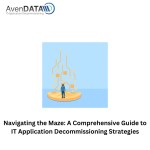In today’s rapidly evolving technological landscape, organizations are increasingly turning to cloud computing to streamline operations and reduce costs. One area where cloud computing has proven particularly beneficial is in the decommissioning of legacy Oracle systems. This blog will explore the role of cloud computing in Oracle decommissioning, highlighting its advantages, practical applications, and the steps organizations can take to leverage cloud technology effectively.
Understanding Oracle Decommissioning
Oracle decommissioning involves retiring outdated Oracle systems that are no longer needed or efficient. This process can be complex, requiring careful planning and execution to ensure data integrity, security, and minimal disruption to business operations. Traditionally, decommissioning has been a resource-intensive task, but cloud computing offers innovative solutions to simplify and enhance this process.
Benefits of Cloud Computing in Oracle Decommissioning
Scalability and Flexibility
Cloud platforms offer unparalleled scalability and flexibility, allowing organizations to handle varying workloads during the decommissioning process. As data is migrated and systems are decommissioned, cloud resources can be scaled up or down to meet demand, ensuring efficiency and cost-effectiveness.
Cost Savings
By leveraging cloud computing, organizations can significantly reduce the costs associated with maintaining on-premises infrastructure. Cloud services operate on a pay-as-you-go model, eliminating the need for substantial capital investment in hardware and software, thus making decommissioning more affordable.
Enhanced Security
Cloud providers invest heavily in security measures to protect data and systems. During Oracle decommissioning, sensitive data can be securely migrated to the cloud, where it benefits from robust encryption, access controls, and monitoring, reducing the risk of data breaches.
Improved Data Management
Cloud computing facilitates better data management through centralized storage and advanced analytics. During decommissioning, data can be organized, archived, and accessed more efficiently in the cloud, ensuring that critical information remains accessible and well-managed.
Practical Applications of Cloud Computing in Oracle Decommissioning
Data Migration
Cloud services offer tools and solutions for seamless data migration from on-premises Oracle systems to cloud environments. Automated migration tools reduce the complexity and time required for transferring data, ensuring that it remains intact and accessible throughout the process.
Archiving and Storage
Decommissioned Oracle systems often contain valuable historical data that needs to be retained for compliance or reference purposes. Cloud storage provides a cost-effective and secure solution for archiving this data, with options for long-term storage at minimal costs.
Disaster Recovery
During the decommissioning process, maintaining a robust disaster recovery plan is crucial. Cloud-based disaster recovery solutions ensure that data is backed up and can be quickly restored in the event of a failure, minimizing downtime and disruption.
Testing and Validation
Before fully decommissioning an Oracle system, it’s essential to test and validate the migration process. Cloud environments offer sandboxing capabilities, allowing organizations to create test environments that replicate the production system, ensuring that everything functions correctly before final decommissioning.
Steps to Leverage Cloud Computing for Oracle Decommissioning
Assess Your Current Systems
Begin by conducting a thorough assessment of your existing Oracle systems to understand what needs to be decommissioned, the data involved, and the specific requirements for migration and storage.
Choose the Right Cloud Provider
Select a cloud provider that offers the services and security features required for your decommissioning project. Consider factors such as scalability, cost, compliance, and support when making your choice.
Develop a Decommissioning Plan
Create a detailed decommissioning plan that outlines the steps, timelines, and responsibilities involved. Include contingencies for potential challenges and ensure that all stakeholders are informed and prepared.
Migrate Data and Systems
Utilize cloud migration tools to transfer data and systems to the cloud. Monitor the migration process closely to address any issues that arise and ensure data integrity.
Validate and Test
Once the migration is complete, conduct thorough testing and validation in a cloud sandbox environment to ensure that all systems and data function as expected.
Conclusion
Cloud computing plays a pivotal role in the decommissioning of Oracle systems, offering scalability, cost savings, enhanced security, and improved data management. By leveraging cloud technology, organizations can simplify the decommissioning process, ensuring a smooth transition with minimal disruption. As businesses continue to evolve, embracing cloud solutions for Oracle decommissioning will be key to maintaining efficiency and staying ahead in a competitive landscape.





.jpg)
Comments